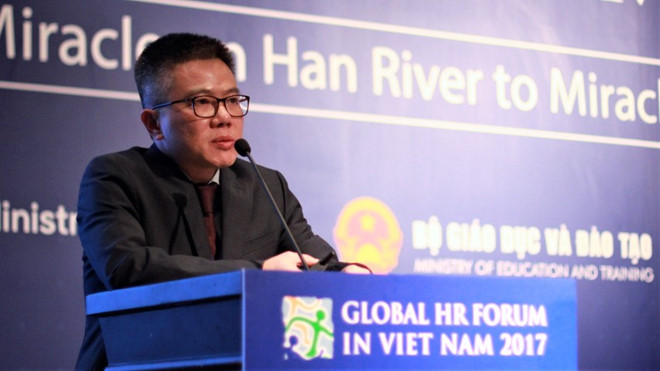[ad_1]

Prof Ngo Bao Chau
On December 14-15, the Ministry of Education of Korea, the Korea Economic Times and the Ministry of Education and Training of Vietnam (MOET) jointly organized the Global Human Resources Forum 2017 in Hanoi.
Professor Chau is the head of MOET’s consultative group, with technical assistance from the World Bank, with members Associate Prof Tran Ngoc Anh, Dr. Nguyen Thi Le Huong and Dr. Pham Hung Hiep.
In the QS ranking of 400 leading universities in Asia, there are five Vietnamese names. Malaysia has 27 schools, Indonesia 17, Thailand 16 and the Philippines six.
The number of scientific articles published by Vietnamese in Scopus journals in 2016 was lower than other regional countries. Malaysia had 28,546 articles, Singapore 19,992, Thailand 14,176, and Indonesia 11,470, while Vietnam had 5,563 articles.
According to Chau, the first challenge for Vietnam’s higher education is ineffective university administration. According to the World Bank, the investment rate per student head in Vietnam is far below Malaysia, Thailand, Singapore and Indonesia.
In 2013, the rate was $645 per student, while it was $12,013 in Singapore.
|
The number of scientific articles published by Vietnamese in Scopus journals in 2016 was lower than other regional countries. Malaysia had 28,546 articles, Singapore 19,992, Thailand 14,176, and Indonesia 11,470, while Vietnam had 5,563 articles. |
Chau believes there are three pillars that need addressing: administration, finance and systematic capability. As for administration, it is necessary to balance self-determination (autonomy) and state management.
According to Hoang Quang Phong, deputy chair of VCCI (the Vietnam Chamber of Commerce & Industry), the problems in education quality can be seen in low competitiveness and productivity.
He cited a report as saying that Vietnam’s productivity is just 4 percent of Singapore, 17.4 percent of Malaysia, 35.2 percent of Thailand, 48.5 percent of the Philippines and 48.7 percent of Indonesia.
Chau proposed improving the efficiency of the use of the state budget for higher education by shifting “from regular expenses allocation to duty assignment through fair competition”.
Regarding the system’s capability, Vietnam needs a new framework to encourage investment in universities and junior colleges.
A MOET report showed that by the end of the 2016-2017 academic year, Vietnam had 235 universities and academies (170 state owned, 60 privately run, 5 wholly foreign owned), 37 research institutes assigned to train PhDs, 33 pedagogy junior colleges (3-year training) and two intermediate pedagogy schools (2-year training).
RELATED NEWS
Universities continue to gain autonomy
University students invent face recognition system
Le Van
[ad_2]
Source link
